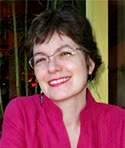My friend Sharon took me to the Metropolitan Opera House Friday night where I was treated to the incredible best that this town can provide in live performance. It amazes me that in three hours of singers singing, musicians playing, lighting people lighting, and innumerable others doing their jobs, that all I noticed going wrong were two very small stumbles caused by long skirts when walking up the tipped stage and one actress promenading who held her skirts rather too high exposing all of her pantaloons.
The opera, Eugene Onegin, is based on a novel length mock-epic poem by Pushkin. Tchaikovsky composed some of the most beautiful music he has written. He also shifted the tone of the original poem from ironic to more sympathetic for most of the characters, especially Tatiana. She begins as a bookish shy girl and becomes a strong woman who has to make practical, not passionate or literary choices. I loved the scene where she is restless with her nurse and soon writing an ill-advised love letter to a man she has just met. Her girlish crush is as insubstantial as the sliver of the crescent moon above her. Karia Mattila sang and acted that scene to perfection.
It comes as no surprise that Onegin rebuffs Tatiana's offer of love in a rather superior tone. She shrinks into herself in shame.
The scenery was absolutely minimal, great walls of light, and the first act, set in a country estate off in the sticks of the steppes, featured a floor of leaves that was swept into clearings suggesting rooms, states of mind, or the work of harvesting. Perfect.
The voice of Lenski, played by Piotr Beczala, a neighbor and minor poet engaged to Tatiana's giddy sister Olga, was particularly affecting. Poor guy, he writes her verse she can barely bring herself to read. She is vain and bouncy, not deeply in love. The catalyst is the disdainful and thoughtless nobleman friend of Lenski, Onegin (played well by Thomas Hampson). He meets the sisters and bookish Tatiana falls in love. Bored and angry that Lenski is subjecting him to a stuffy provincial dance, when he expected a simple country dinner party, he fatefully exacts revenge by flirting with Olga. It leads to a falling out between the men and a demand for satisfaction from Lenski. Lenski's scene before the dual, his monologue on the waste of his life and fate of his love, was so beautifully sung I had tears in my eyes.
Bang bang. And for once the dying opera star was not able to sing through consumption or bullets, he staggers and dies.
But it doesn't end here, the story is really Tatiana's. In some ways it is a feminist story, a realistic story. She doesn't kill herself or die of grief. No, she makes an advantageous marriage, and unlike her sister, she is able to appreciate the love of a good man even if she feels no great passion for him. And what sweet revenge, when the more humbled Onegin meets her in the capital and falls in love with the poised woman she has become, she is able to send him on his way much as he did to her long ago.
I love being at the Met. From the chandeliers being drawn up as the lights dim, the gold and crimson of walls and seats, the terribly discrete subtitles on the backs of the seats, to the small pleasures of watching others at the intermission, and finding ourselves on a Friday night among the younger women there. Thanks, Sharon, for sharing this fine evening with me!
Sunday, February 1, 2009
Subscribe to:
Post Comments (Atom)







No comments:
Post a Comment